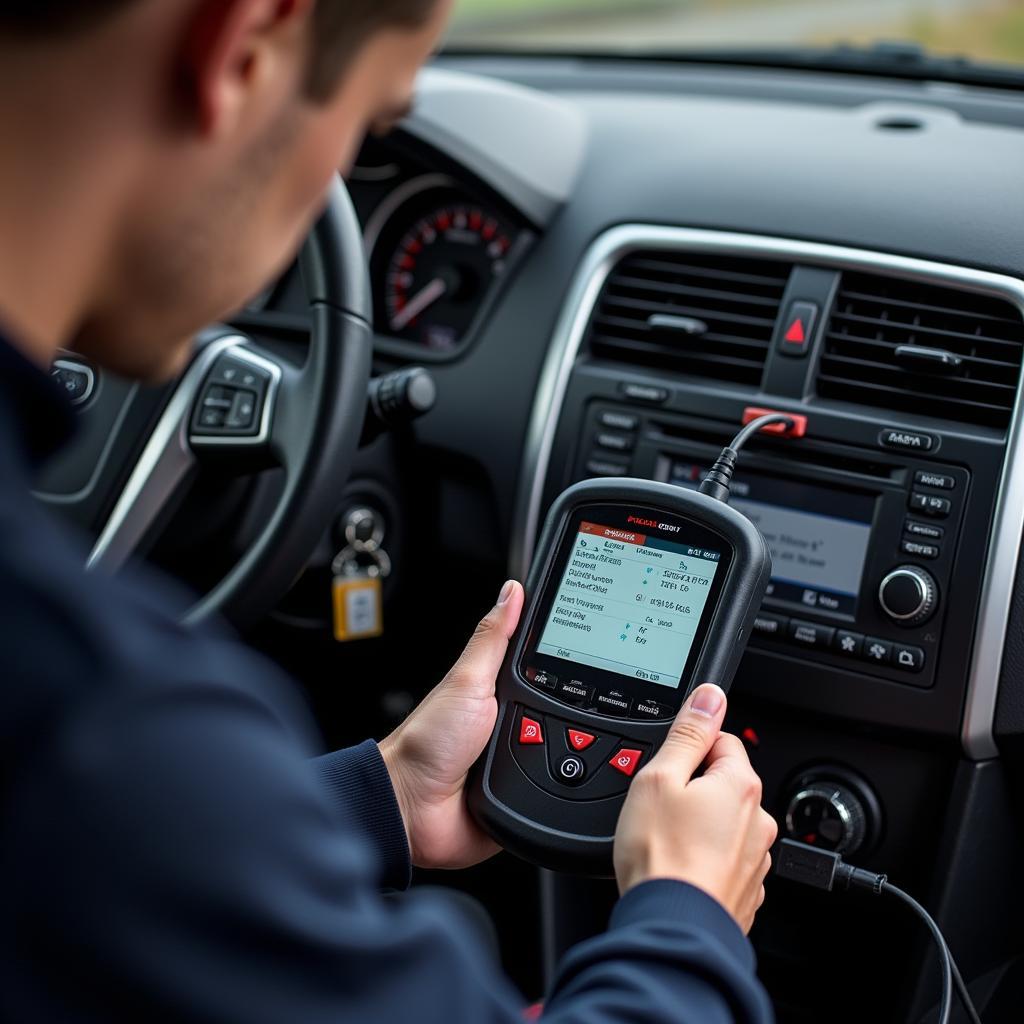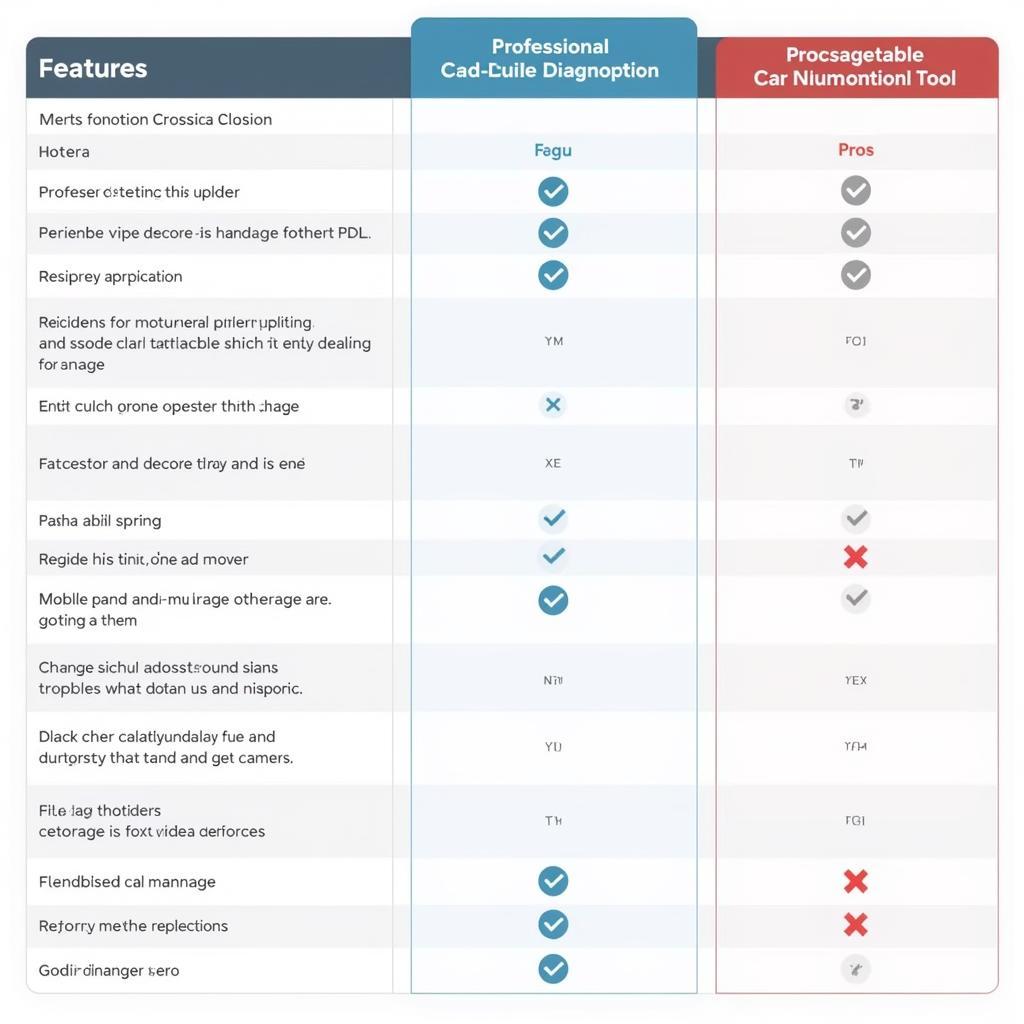Professional Car Diagnostics have revolutionized the way we understand and maintain our vehicles. Gone are the days of relying solely on a mechanic’s intuition and experience. Today, advanced diagnostic tools and software provide a precise and in-depth look into the intricate workings of modern cars, enabling technicians to identify and resolve issues with greater accuracy and efficiency.
What are Professional Car Diagnostics?
Professional car diagnostics involve the use of specialized equipment and software to communicate with a vehicle’s onboard computer system, often referred to as the Engine Control Unit (ECU). This system continuously monitors various sensors and actuators throughout the car, collecting data on engine performance, emissions, safety systems, and more.
 Professional Car Diagnostic Tools
Professional Car Diagnostic Tools
By accessing the ECU through the vehicle’s OBD-II port, professional car diagnostic tools can retrieve and interpret this data, providing valuable insights into the vehicle’s overall health and pinpointing potential problems. This information is typically presented in the form of Diagnostic Trouble Codes (DTCs), which are standardized codes that correspond to specific issues within the vehicle’s systems.
Why are Professional Car Diagnostics Important?
Professional car diagnostics are crucial for several reasons:
- Accurate Diagnosis: They provide specific and accurate information about the root cause of car problems, eliminating guesswork and unnecessary repairs.
- Early Detection: Diagnostic tools can detect minor issues before they escalate into major and costly problems, saving car owners time and money in the long run.
- Enhanced Repair Efficiency: With a precise diagnosis, mechanics can streamline the repair process, targeting the specific area of concern and minimizing labor costs.
- Improved Vehicle Performance: By identifying and resolving underlying issues, professional car diagnostics can help optimize engine performance, fuel efficiency, and overall vehicle reliability.
- Increased Safety: Diagnostics play a crucial role in identifying and addressing problems related to safety-critical systems such as airbags, anti-lock brakes, and electronic stability control, ensuring a safer driving experience.
The Evolution of Car Diagnostics
The field of car diagnostics has come a long way from its humble beginnings. In the past, mechanics relied heavily on their senses and experience to diagnose car problems. They would listen for unusual noises, look for visual cues like smoke or leaks, and even use their sense of smell to detect burning fluids.
The introduction of onboard computers in vehicles in the 1980s marked a significant turning point. These early systems were relatively basic, but they paved the way for the sophisticated diagnostic capabilities we have today. As vehicles became more complex, so too did the diagnostic tools used to service them.
Today, professional car diagnostic tools come in various forms, from handheld scanners to advanced software suites that can be accessed on laptops and tablets. These tools offer a wide range of features and capabilities, allowing technicians to delve deeper into a vehicle’s systems than ever before.
“With the increasing complexity of modern vehicles, professional car diagnostics are no longer just a luxury but a necessity,” says John Smith, a certified master technician with over 20 years of experience. “These tools empower us to provide our customers with faster, more accurate, and ultimately, more cost-effective repairs.”
Choosing the Right Professional Car Diagnostic Tool
The market is flooded with a wide variety of professional car diagnostic tools, each catering to different needs and budgets. Here are some key factors to consider when selecting a tool:
- Vehicle Compatibility: Ensure that the tool is compatible with the make, model, and year of the vehicle you intend to diagnose.
- Diagnostic Capabilities: Determine the level of detail and the specific systems you need to access. Some tools offer basic code reading, while others provide advanced functionalities like live data streaming, actuator tests, and ECU coding.
- Software Updates: Choose a tool that offers regular software updates to ensure compatibility with the latest vehicle models and technologies.
- User Interface: Opt for a tool with an intuitive and user-friendly interface that allows for easy navigation and interpretation of data.
- Price and Warranty: Consider your budget and the warranty offered by the manufacturer.
 Choosing the Right Car Diagnostic Tool
Choosing the Right Car Diagnostic Tool
The Future of Car Diagnostics
The future of professional car diagnostics looks promising, with technological advancements continuing to shape the industry. Here are some key trends to watch out for:
- Cloud-based Diagnostics: Cloud-based platforms are gaining traction, allowing for real-time data sharing, remote diagnostics, and access to vast databases of technical information.
- Artificial Intelligence (AI): AI-powered diagnostic tools are emerging, capable of analyzing large datasets, identifying patterns, and providing predictive maintenance suggestions.
- Augmented Reality (AR) and Virtual Reality (VR): AR and VR technologies have the potential to revolutionize car diagnostics by providing technicians with interactive, real-time guidance and visualizations during the repair process.
Conclusion
Professional car diagnostics have become indispensable in the automotive industry, empowering mechanics and car owners alike with the knowledge and tools to understand and maintain modern vehicles. As technology continues to advance, we can expect even more sophisticated and innovative diagnostic solutions to emerge, further enhancing the accuracy, efficiency, and convenience of car repairs.

Leave a Reply